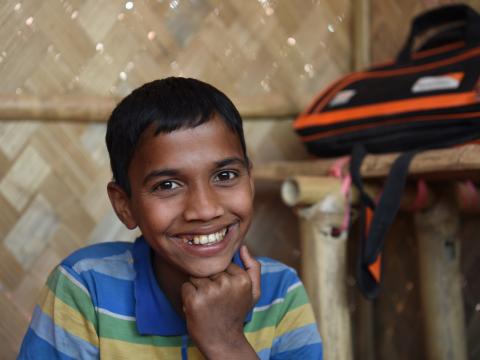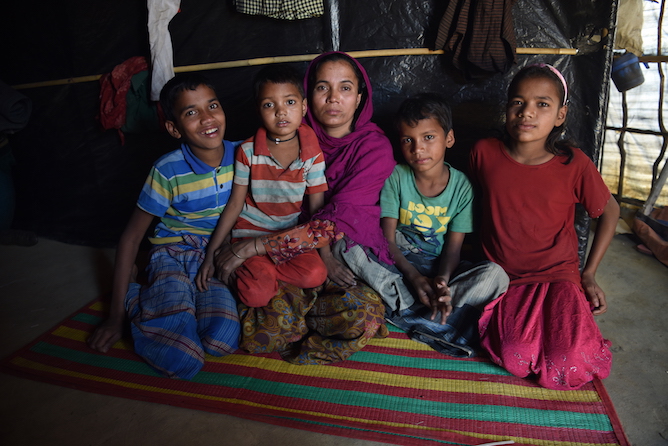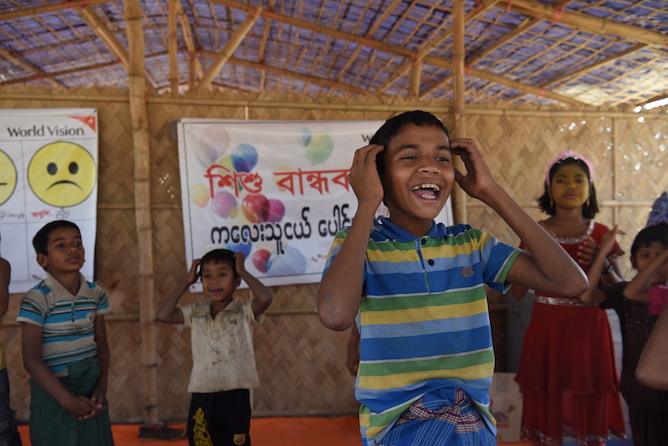Myanmar child refugee: “This space helps us overcome our worries”

The sweet melodies of rhymes grow louder closer to the Child-Friendly Spaces (CFS), set up by World Vision.
10-year-old Yacob doesn’t hesitate to lead the next rhyme, his favourite, when requested by the facilitator. "Is everyone ready to start. I will do the actions follow me," says Yacob.
Taking a deep breath and positioning himself in centre stage, Yacob, loudly utters 'Gong gong gonrelubala'. With all eyes on him, the rest of the children vigilantly repeat after him.
Yacob is one of 2,307 children, who regularly attends World Vision’s CFS where children get to express themselves, learn and play with other children in sessions led by trained facilitators.
Yacob’s unforeseen circumstance led him to flee from the Rakhine state, Myanmar, with his 11-member family to Bangladesh. As per the latest ISCG situation report, 688,000 new arrivals have been reported as of 27 January 2018.
"Back in Burma (Myanmar) my father was a farmer and he also went fishing. Along with my siblings I used to attend school regularly. I was in Grade 2 when we left. We used to learn Burmese literature in school. But it all came to an end the day our house got burnt. The houses in our village were on fire. We couldn't run to the jungle because it was on fire too. We flee to another village but that village was also attacked. We were stranded so we fled again to a canal and stayed there for two days with no food. We made it across the border and now we live here in the camps."
Getting all the children to safety on the other side was an ordeal that Yacob’s mother, 40-year-old Noorkin, would never forget. Guarding her children like a hawk, Noorkin, never left their side for a second.
"I solely depended on God to get our family through this. I had to keep telling my children not to leave out sight for even once. We had to be on guard all the time," Noorkin says.
Being uprooted from the familiar; their home, school, and friends terrified the children and glimpses of anxiousness emulated from their faces.
"They were worried. When we came here initially they had nothing much to do. It was a new place for them.
The environment was unfamiliar. They used to be at home mostly. It made them sad. There was no school and as a parent, you fear about their future. You start thinking what will become of your children. I could see what our condition had done to the children," she says.
Apart from facing multiple challenges like lack of food, clean water, clothes, and shelter, children, and women are in critical need of support and care to address the urgent protection needs they face.
At the centre, wrapping up the sing-along time, the children are divided into groups for activity time. Reaching out into the activity box, the facilitator pulls out puzzles, colouring books, blocks, and shapes. Yacob and his friends eagerly wait to see which activity they get to start their day with.
An infectious smile beams off Yacob’s face when he the mystery of the activity is solved.
"We get the butterfly and car blocks. Let's start solving it," he says.
Referring to the image of the butterfly on the box, Yacob and his friends try to join the blocks to solve the puzzle in the shortest possible time.
"I come to this centre, which is close to my house, to learn something. This space help us overcome our worries. I like to learn and study. When I come to the centre I get to learn poems and recite them. We also recite Burmese poems. I learned how to wash our hands properly because if we don't then we can fall sick. I have made a good friend here in the centre. His name is Kalam. We like doing things together," says Yacob.
Yacob attending World Vision’s child-friendly space provides much-needed respite for a perturbed mother like Noorkin.
"Because of the violence, we fled from my children were unable to continue their studies. There was no school they went to. Now with the centre in our camp, the children at least get some learning. I am happy that Yacob attends regularly. At home when he comes back he shares with me what he learned at the centre and sings the rhymes. The whole struggle of leaving our home in Burma had affected them. I see them getting better now. Sending them to the centre helps because they get to learn and play with other children.
The centre has also helped them overcome their worries. They are slowly getting back to feeling normal again. I desire a bright future for my children where they can be what they want to be," says Noorkin.
Proud of her son, Noorkin is happy that Yacob has found a place where he gets to be himself - a vibrant energetic boy.
Enumerating his likes and desires Yacob says,
"I like being a leader. At the centre, I get the children together and them ask them to follow me when I am doing the actions."
"I tell them 'Please I am going to start reciting the poem, so follow me'. I am a good boy and a quick learner. I also make other children laugh. It is fun. I want to learn more and more because I want to become a teacher when I grow up. I would like to teach the children Burmese poems, counting in English and Burmese."
World Vision Interventions:
9 Child-Friendly Spaces have been established
5,437 people have benefitted from child protection and gender-based violence awareness sessions
2,307 children are regularly attending dedicated spaces where they can play and interact with other children in a safe environment
Protection has been mainstreamed throughout World Vision response programming, with unique considerations made for each sector interventions. World Vision staff and volunteers are trained in the identification and referral of child protection and gender-based violence survivors to appropriate services.

